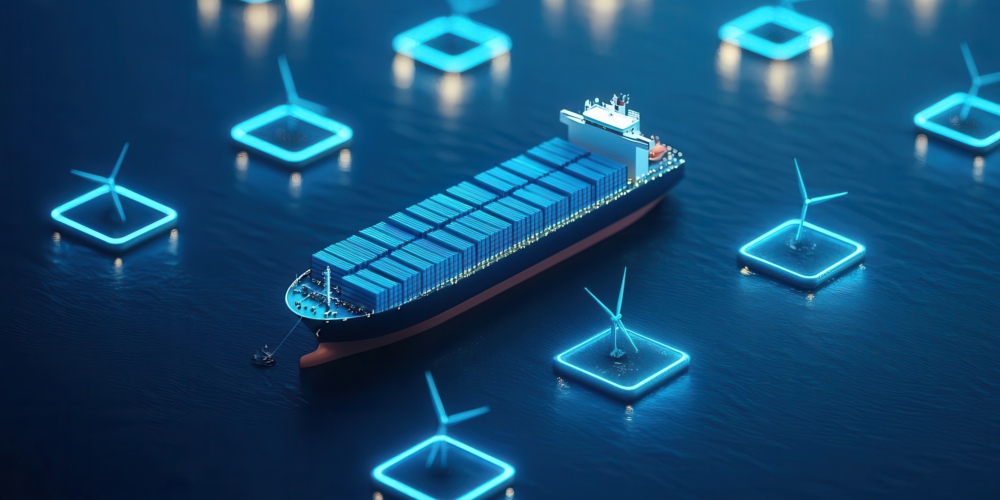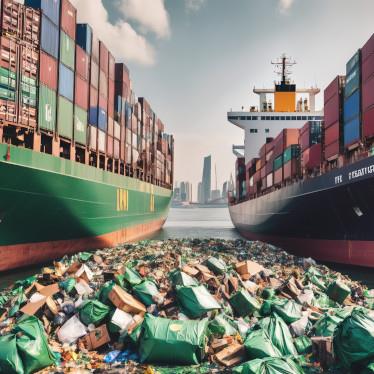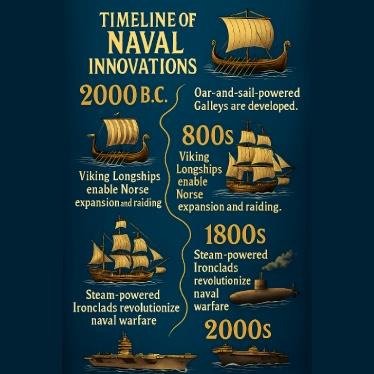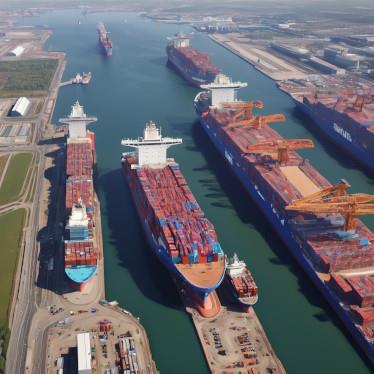
As environmental awareness grows globally, the maritime industry is actively adopting green technologies to reduce its carbon footprint and operate more sustainably. From cleaner fuel alternatives to energy-efficient practices, sustainable maritime solutions are helping reduce emissions, protect marine ecosystems, and make shipping more eco-friendly.
Alternative Fuels: Reducing Carbon Emissions
One of the most significant advancements in sustainable maritime technology is the use of alternative fuels. Traditional marine fuel is a significant source of greenhouse gas emissions, but new alternatives like LNG (Liquefied Natural Gas), hydrogen fuel cells, and biofuels are helping reduce these emissions. LNG, for example, emits up to 20% less CO₂ than traditional marine fuels, making it a cleaner option. Hydrogen fuel cells, though still in early stages of development for maritime use, promise zero emissions and can power vessels with only water as a byproduct.
Wind and Solar Power Integration
Renewable energy sources like wind and solar power are becoming increasingly popular in maritime solutions. Solar panels can be installed on the deck of vessels to harness solar energy, which can power essential functions and reduce fuel consumption. Similarly, sail technology has seen a revival in modern forms, where large, retractable sails are used on cargo ships to harness wind power, cutting fuel usage and emissions. Wind-assisted ships, such as the ones using rotor sails, are already operating on commercial routes and showing promising results in fuel savings.
Hull Design and Coatings: Enhanced Fuel Efficiency
Advanced hull designs and eco-friendly coatings are improving vessel efficiency and reducing the environmental impact of ships. Streamlined hull designs reduce water resistance, which allows ships to consume less fuel. Additionally, anti-fouling coatings prevent the buildup of marine organisms on the hull, which also improves fuel efficiency and minimizes the spread of invasive species.
Electrification and Hybrid Propulsion Systems
The adoption of electric and hybrid propulsion systems is another crucial green solution. Battery-powered vessels are particularly useful for short trips, such as ferries or harbor services, where full electrification is feasible. Hybrid propulsion, which combines electric and traditional engines, allows for reduced emissions on longer voyages. Hybrid systems allow vessels to switch to electric mode in sensitive areas like ports, minimizing noise and air pollution in these environments.
Smart Port Technology and Digital Optimization
Smart port technology is an essential component of sustainable maritime solutions. Ports can optimize vessel traffic, loading, and unloading through IoT and AI-powered systems. This reduces idle time and ensures more efficient port operations, which, in turn, lowers emissions and conserves energy. Digital optimization of routes and schedules is another strategy, as AI can analyze weather and ocean conditions to help ships follow fuel-efficient routes, cutting down emissions and travel time.
Waste Management and Water Treatment
Proper waste management and water treatment solutions are critical for minimizing the environmental impact of ships. Wastewater from ships, if untreated, can damage marine ecosystems, but modern treatment systems can process waste onboard, ensuring compliance with international environmental standards. Additionally, ballast water management systems help prevent the transfer of invasive species between ecosystems, which is essential for preserving biodiversity.
Autonomous and AI-Driven Technologies
Autonomous ships and AI-driven technologies are becoming more prominent in sustainable maritime practices. Autonomous vessels are typically more fuel-efficient due to precise route planning and optimized speeds. Furthermore, these vessels use real-time data to adjust their routes, reducing unnecessary fuel consumption and adapting to environmental conditions.
Toward a Greener Maritime Future
The maritime industry is moving toward a sustainable future through the adoption of green technology solutions. From alternative fuels and renewable energy sources to advanced waste management and smart technology, these innovations are driving the sector toward a reduced environmental footprint. As these technologies continue to evolve, the maritime industry is on the path to creating a cleaner, greener, and more sustainable future for global shipping and marine activities.
As environmental awareness grows globally, the maritime industry is actively adopting green technologies to reduce its carbon footprint and operate more sustainably. From cleaner fuel alternatives to energy-efficient practices, sustainable maritime solutions are helping reduce emissions, protect marine ecosystems, and make shipping more eco-friendly.
Alternative Fuels: Reducing Carbon Emissions
One of the most significant advancements in sustainable maritime technology is the use of alternative fuels. Traditional marine fuel is a significant source of greenhouse gas emissions, but new alternatives like LNG (Liquefied Natural Gas), hydrogen fuel cells, and biofuels are helping reduce these emissions. LNG, for example, emits up to 20% less CO₂ than traditional marine fuels, making it a cleaner option. Hydrogen fuel cells, though still in early stages of development for maritime use, promise zero emissions and can power vessels with only water as a byproduct.
Wind and Solar Power Integration
Renewable energy sources like wind and solar power are becoming increasingly popular in maritime solutions. Solar panels can be installed on the deck of vessels to harness solar energy, which can power essential functions and reduce fuel consumption. Similarly, sail technology has seen a revival in modern forms, where large, retractable sails are used on cargo ships to harness wind power, cutting fuel usage and emissions. Wind-assisted ships, such as the ones using rotor sails, are already operating on commercial routes and showing promising results in fuel savings.
Hull Design and Coatings: Enhanced Fuel Efficiency
Advanced hull designs and eco-friendly coatings are improving vessel efficiency and reducing the environmental impact of ships. Streamlined hull designs reduce water resistance, which allows ships to consume less fuel. Additionally, anti-fouling coatings prevent the buildup of marine organisms on the hull, which also improves fuel efficiency and minimizes the spread of invasive species.
Electrification and Hybrid Propulsion Systems
The adoption of electric and hybrid propulsion systems is another crucial green solution. Battery-powered vessels are particularly useful for short trips, such as ferries or harbor services, where full electrification is feasible. Hybrid propulsion, which combines electric and traditional engines, allows for reduced emissions on longer voyages. Hybrid systems allow vessels to switch to electric mode in sensitive areas like ports, minimizing noise and air pollution in these environments.
Smart Port Technology and Digital Optimization
Smart port technology is an essential component of sustainable maritime solutions. Ports can optimize vessel traffic, loading, and unloading through IoT and AI-powered systems. This reduces idle time and ensures more efficient port operations, which, in turn, lowers emissions and conserves energy. Digital optimization of routes and schedules is another strategy, as AI can analyze weather and ocean conditions to help ships follow fuel-efficient routes, cutting down emissions and travel time.
Waste Management and Water Treatment
Proper waste management and water treatment solutions are critical for minimizing the environmental impact of ships. Wastewater from ships, if untreated, can damage marine ecosystems, but modern treatment systems can process waste onboard, ensuring compliance with international environmental standards. Additionally, ballast water management systems help prevent the transfer of invasive species between ecosystems, which is essential for preserving biodiversity.
Autonomous and AI-Driven Technologies
Autonomous ships and AI-driven technologies are becoming more prominent in sustainable maritime practices. Autonomous vessels are typically more fuel-efficient due to precise route planning and optimized speeds. Furthermore, these vessels use real-time data to adjust their routes, reducing unnecessary fuel consumption and adapting to environmental conditions.
Toward a Greener Maritime Future
The maritime industry is moving toward a sustainable future through the adoption of green technology solutions. From alternative fuels and renewable energy sources to advanced waste management and smart technology, these innovations are driving the sector toward a reduced environmental footprint. As these technologies continue to evolve, the maritime industry is on the path to creating a cleaner, greener, and more sustainable future for global shipping and marine activities.





